Why do huskies have eyes in different colors? They can have amazing icy blue eyes, and sometimes one eye is a different color than the other…
This post tells you all about husky eyes.
Huskies get their different eye colors from something called heterochromia. Heterochromia happens when there’s either too much or too little melanin in the eye’s color part. Melanin is what decides the color of the eye.
Let’s dive deeper into heterochromia and all the pretty eye colors huskies can have.
Table of Contents
Why Do Huskies Have Different Colored Eyes?
Heterochromia is the term used to describe the phenomenon of having different colored eyes. This can happen not just in dogs, but in cats, horses, and humans too!
The eye color comes from a color stuff called melanin. Most dogs have a lot of melanin-making cells in the eye color part. That’s why many dogs have brown eyes.
There’s a genetic mutation present in many huskies which affects the strength of the melanin as well as it’s distribution. Where there is a lack of melanin, there will be a lack of melanocytes, which finally leads to different eye colors, usually being blue. Source
Is Heterochromia bad in dogs?
Although huskies are prone to eye problems, heterochromia itself does not cause any harm or contribute to eye problems. It is usually hereditary and does not affect your dog’s ability to see.
Having two different eye colors usually isn’t bad or anything to worry about. However, in some cases, eye color could be an indication of something serious.
If you notice that your dog’s eyes are changing color, to become cloudy or unusually light blue, this may very well be a serious health issue like cataracts. In this case, you should seek help as soon as possible from a professional veterinarian.
What Eye Colors Can Huskies Have?
Huskies can have many different eye colors, as well as different combinations. Let’s take a look at the variations below.
1. Blue-eyed husky
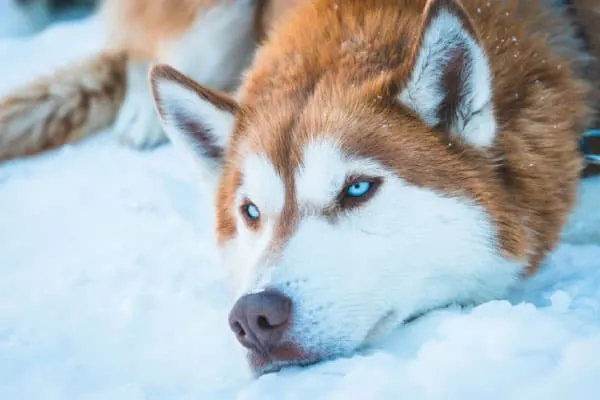
Blue eyes are common amongst huskies and are a classic example of Heterochromia. Around 4 out of 10 huskies will have two blue eyes. This eye color is accepted by the American Kennel Club. In fact, ALL newborn huskies start life with blue eyes and later change if destined to.
2. Bi-Eyed Husky
Check out Takaani! The beautiful bi-eyed husky
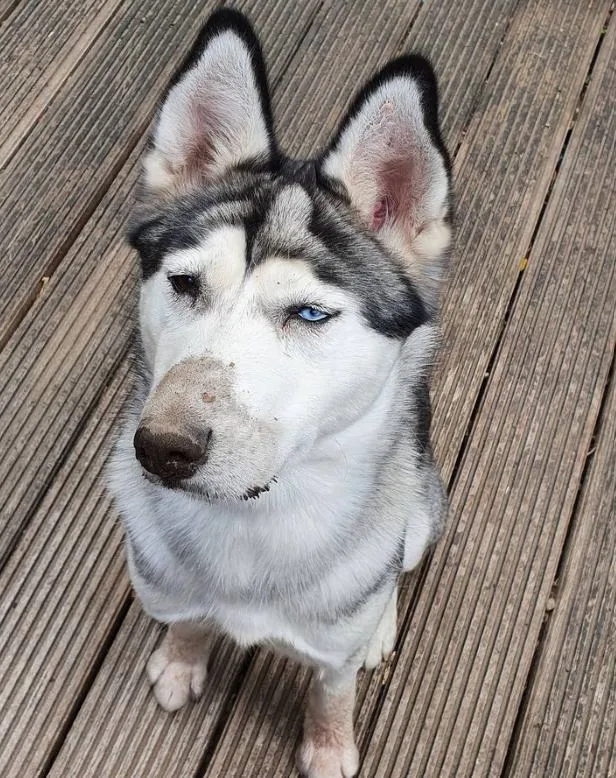
Another shot of Takaani
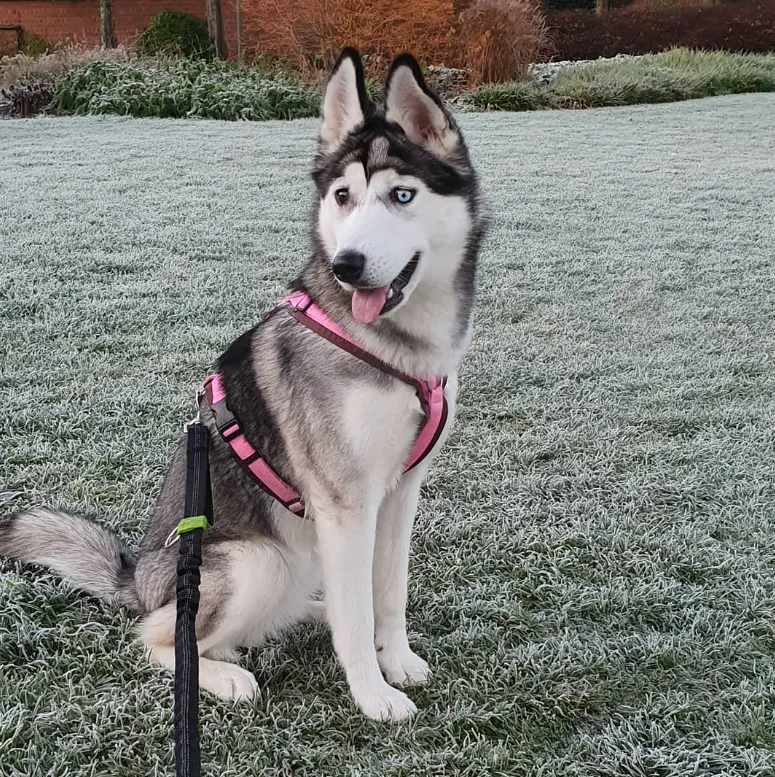
Bi-Eyed huskies have one blue eye and one brown eye. Bi-Eyed huskies are slightly rarer than huskies with two blue eyes.
3. Parti-colored eyes in Huskies
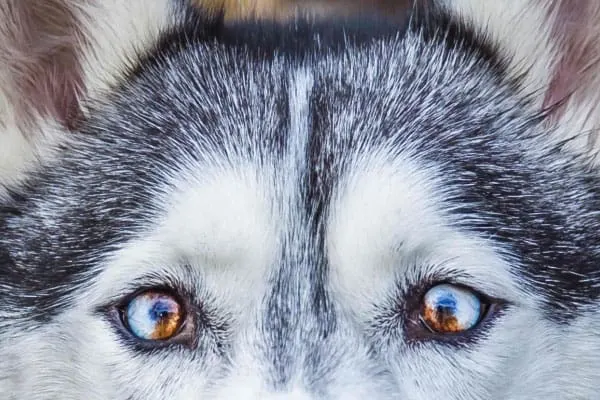
This is the rarest eye color variation and it’s called parti-colored. Only about 5% of the husky population will have part-colored eyes.
As you can see parti-colored means there are two colors in one single eye, often blended together on one side.
4. Brown-eyed husky
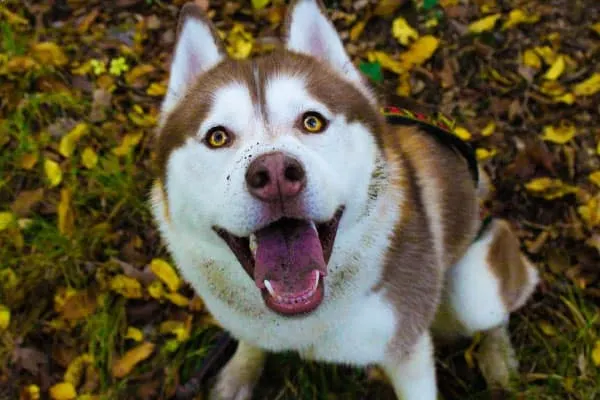
Brown eyes are usually as common as blue eyes, around 4 out of 10 huskies will have two brown eyes. There can be many different shades and tones of brown.
As most people think of huskies having blue eyes, many aren’t away that brown is just as common!
Can Husky Eyes Change Color?
A newborn husky will always start life with blue eyes that will later change if destined to. Around 5-8 weeks is when a husky’s eye color can start to change, depending on their genes and concentration of melanin.
Usually, by 3-4 months your husky’s eye color should be settled. However, according to some husky owners, they’ve seen their husky change eye color up until 6 months of age.
In an adult husky over 1 year, it’s more uncommon to see a change of eye color and if you do, you should take your husky to the vet for a check-up to rule out any health issues.
Are Blue-Eyes Dogs More Likely To Go Blind?
While the sudden development of blue eyes can be a symptom of a future eye condition, there is still no scientific evidence that suggests blue-eyed dogs are more likely to go blind.
If your dog’s eye color starts to change and develops a blue haziness, this could be signs of cataracts or corneal dystrophy. Although, being born with blue eyes has not been linked to an increased chance of future eye problems.
Blue eyes lack melanin but they do contain pigment, it is sometimes thought that brown eyes are stronger and are less prone to sun damage and cataracts but again, this isn’t technically true. Cataracts are usually not even caused by sun damage, they are the result of the puppy inheriting recessive genes.
The Siberian husky is more prone to health issues and about 8-10% of the population have hereditary eye conditions. People do like to believe that heterochromia contributes to this, but science has not confirmed that to be the case. Source
Popular articles on My Happy Husky ⭐
● How Smart Are Huskies? IQ Test Results
● Why Are Huskies So Dramatic
● Siberian Husky Prices Across Different States
● Red Huskies! How Rare Are They?

Are Huskies Prone To Eye Problems?
The Siberian Husky suffers from three main eye problems, but these issues are not because of Heterochromia. A lot of people believe that the variations in husky eye color contribute to these eye problems, but this is not true.
Huskies suffer from Juvenile Cataracts, Corneal Dystrophy and, Progressive Retinal Atrophy (PRA)
Juvenile Cataracts
If your husky has cataracts, the signs will start showing around the 6-month to 1-year mark, although in some cases you can see signs from as young as 3 months old. The eye usually becomes cloudy, due to a build-up of protein which ultimately blocks the lense.
Corneal Dystrophy
This is usually found more in young adult female huskies rather than males; typically this eye issue is rarer than cataracts. With this eye condition, you’ll see a hazy blue film build up over the cornea. It can sometimes be mistaken for cataracts.
Progressive Retinal Atrophy (PRA)
This eye condition affects the retina of the eye. At first, your husky will lose night vision, and then with time day vision, until blind. Male puppies usually suffer from this condition worse than females and can, unfortunately, go blind from a young age. Source

Other Breeds That Have Heterochromia
It’s not just Siberian Huskies that have the beautiful heterochromia condition. Many other breeds have this too.
Here are some other breeds that have Heterochromia:
● Welsh Corgis
● Australian Shepherds
● Border Collies
● Chihuahuas
● Australian Cattle Dogs
● Dachshunds
● Great Danes
● Beagles
● Shetland Sheepdog
● Dalmatians
● Shih Tzus
Do Huskies Need Eye Check Ups
Due to huskies having many eye conditions, it is recommended that you register your husky with the Canine Eye Registry Foundation or the Siberian Husky Ophthalmologic Registry. Before buying a husky puppy, you should check that the parents to the puppy are registered on this list.
Huskies should have regular eye check-ups of at least 1-2 times per year with your local veterinarian. It’s also best practice to pay close attention to their eyes especially when they’re still young as you may detect signs of eye conditions early on.
My Happy Husky Trending Article: Best Dog Food for Huskies (Updated)
Most Recommended For Huskies
Best Brushes For Husky Shedding ⭐
The Furminator Undercoat Rake and a Hertzko Slicker Brush are by far the two best brushes that any husky owner should use.
Best Online Training Program For Huskies⭐
Brain Training For Dogs has become very popular with Siberian Huskies in the last few years. Owners that have tried it say amazing things about the incredible results and how easily implemented the training is.
Best Husky Puppy Book ⭐
If you would like an easy to read guide for training your husky puppy, check out my book The Husky Puppy Handbook on Amazon. All purchases are greatly appreciated.

Disclaimer
The advice given in this article is for educational purposes only and does not constitute professional advice in any context. Before making any decisions that may affect the health and/or safety of your dog, you should always consult a trained veterinarian in your local area. For the FULL disclaimer Visit HereCopyright Notice: The content produced and published on My Happy Husky is unique and original. My Happy Husky makes an active effort to search for plagiarized content using plagiarism detection software. If plagiarized content is found, action will be taken.
